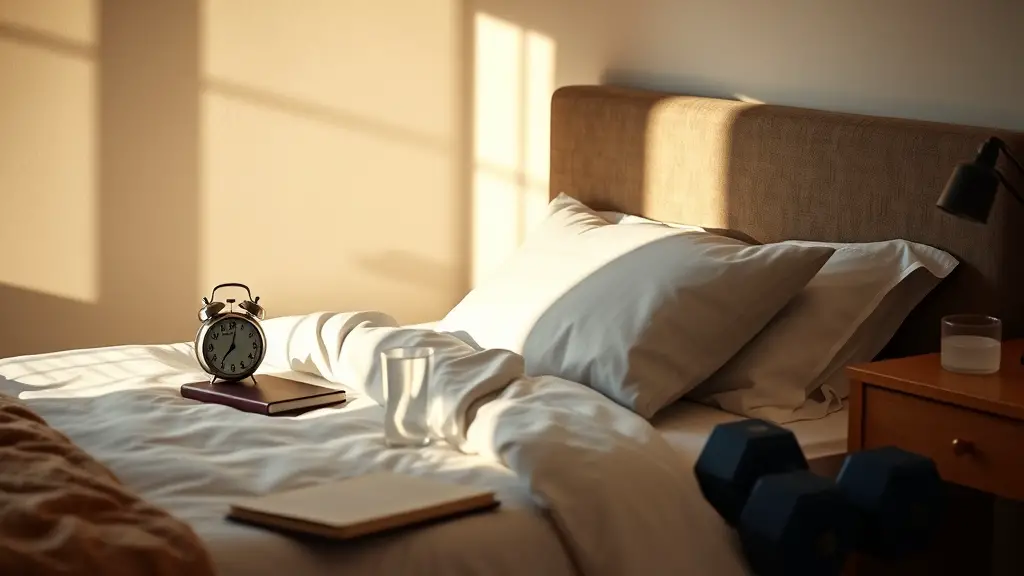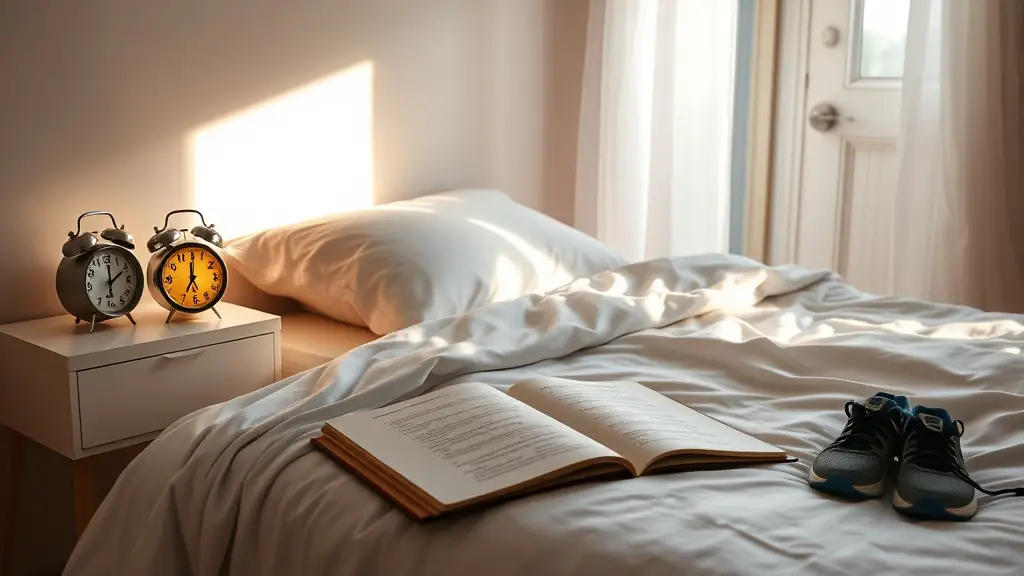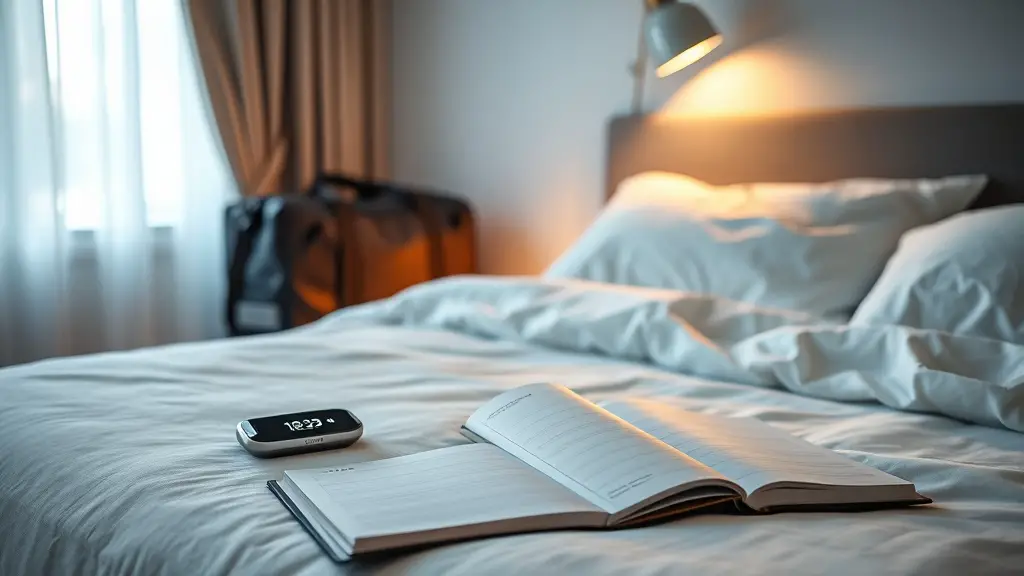How to Optimize Your Sleep for Maximum Gym Gains

To optimize your sleep for maximum gym gains, aim for 7-9 hours of quality rest. Maintain a consistent sleep schedule to regulate your internal clock and enhance recovery. Create a sleep-friendly environment by controlling light, noise, and temperature. Prioritize nutrition—focus on magnesium-rich foods and lean proteins. Manage stress with relaxation techniques and limit screen time before bed to boost melatonin production. By refining these habits, you’ll reveal your full potential, and there’s more to explore on this topic.
The Importance of Sleep for Muscle Recovery

While you may focus on your workout routine and nutrition, sleep often plays an essential, yet overlooked, role in muscle recovery. Quality sleep is important for muscle repair, as it’s during these hours that your body initiates the recovery process. Growth hormone, released primarily during deep sleep, aids in muscle tissue regeneration and repair. Without adequate sleep, your body struggles to maintain hormonal balance, which can hinder muscle growth and overall performance.
Research shows that insufficient sleep can lead to increased levels of cortisol, a stress hormone that may impede muscle recovery and promote fat gain. Aiming for 7-9 hours of restorative sleep nightly allows your body to optimize these processes. By prioritizing sleep alongside your workouts and nutrition, you’re setting yourself up for greater gains, enhanced recovery, and improved overall health. Optimize your sleep, and you’ll notice the difference in your performance and muscle gains.
Understanding Sleep Cycles and Their Impact on Performance
Understanding sleep cycles is essential for maximizing your gym performance. Each stage of sleep plays a specific role in muscle recovery and overall health, influencing how effectively you can repair and grow after workouts. By recognizing these stages, you can better tailor your sleep habits to support your fitness goals.
Sleep Stages Explained
Sleep stages play an essential role in your overall recovery and performance, as each stage contributes uniquely to physical and mental rejuvenation. The sleep cycle consists of light sleep, deep sleep, and REM sleep, each serving distinct functions. Light sleep prepares your body for deeper stages, while deep sleep is vital for muscle recovery and growth hormone release. REM sleep enhances cognitive functions and emotional balance. Disruptions like sleep fragmentation and sleep deprivation can severely impact this sleep architecture, leading to poor performance. Maintaining a consistent circadian rhythm helps optimize these stages, ensuring you reap the benefits of each. Prioritizing quality sleep will support your fitness goals and overall wellness.
Impact on Recovery
The quality of your sleep directly influences your recovery, which is vital for maximizing gym gains. Sleep cycles, particularly deep sleep, play an important role in muscle repair and growth. During this phase, your body releases growth hormones that promote tissue recovery and muscle synthesis. Conversely, sleep deprivation effects can hinder your progress, leading to increased fatigue and decreased performance. Lack of adequate sleep not only slows down muscle repair but also elevates stress hormones like cortisol, which can negatively impact your gains. Prioritizing restorative sleep guarantees your body has the necessary time to recover and adapt to your workouts, ultimately enhancing your strength and endurance in the gym. Remember, quality sleep is as vital as your training regimen.
Establishing a Consistent Sleep Schedule

Establishing a consistent sleep schedule is essential for maximizing your gym gains. Research shows that a regular routine helps regulate your body’s internal clock, improving sleep quality and recovery. Additionally, optimizing your sleep environment can further enhance your ability to fall and stay asleep, ensuring you wake up refreshed and ready to perform.
Importance of Routine
While you might think that occasional late nights won’t impact your gym performance, a consistent sleep schedule is essential for optimizing recovery and enhancing muscle growth. Sleep consistency helps regulate your body’s internal clock, making it easier to fall asleep and wake up at the same time each day. Establishing bedtime rituals, like dimming lights or reading, can signal your body that it’s time to wind down.
| Benefits of Sleep Routine | Effects on Performance |
|---|---|
| Improved sleep quality | Enhanced muscle recovery |
| Better hormone regulation | Increased energy levels |
| Enhanced mental focus | Improved workout performance |
Incorporating these practices can lead to more effective training sessions and faster recovery times.
Sleep Environment Optimization
A consistent sleep schedule won’t be effective without the right sleep environment. To guarantee ideal rest, focus on these four key elements:
- Sleep Temperature: Maintain a cool room, ideally between 60-67°F, for better sleep quality.
- Light Control: Use blackout curtains to achieve total room darkness, reducing distractions and melatonin disruption.
- Noise Reduction: Incorporate white noise machines or earplugs to minimize disruptive sounds, promoting deeper sleep.
- Bedding Comfort: Invest in quality mattresses and pillows that support your body, enhancing restful slumber.
Additionally, consider air quality, scent therapy, and color psychology to further enhance your sleep environment. A well-optimized setting fosters rejuvenation, ensuring you’re primed for maximum gym gains.
Creating a Sleep-Friendly Environment
Creating a sleep-friendly environment is fundamental for maximizing your gym gains, and there are several key factors to take into account. Start with sleep hygiene: keep your bedroom clean and clutter-free. Your mattress comfort and pillow selection play significant roles in supporting restful sleep. Aim for a favorable bedroom temperature, generally around 60-67°F (15-19°C). Control lighting with blackout curtains to block out disturbances. Noise reduction is essential; consider sound machines or earplugs for a quieter atmosphere.
Incorporate air quality improvements and aroma therapy for a calming effect. Here’s a quick reference table to help you remember these aspects:
| Factor | Recommendation | Benefits |
|---|---|---|
| Bedroom Temperature | 60-67°F (15-19°C) | Promotes deeper sleep |
| Lighting Control | Blackout curtains | Reduces disturbances |
| Noise Reduction | Sound machines/earplugs | Enhances sleep quality |
| Mattress Comfort | Choose based on preference | Supports body alignment |
| Pillow Selection | Firmness to preference | Reduces neck strain |
The Role of Nutrition in Sleep Quality

Nutrition plays an essential role in sleep quality, influencing both the duration and depth of your rest. To maximize your sleep benefits, consider the following sleep nutrients and their timing:
Nutrition significantly impacts sleep quality, affecting both how long and how deeply we rest.
- Magnesium-rich foods: Spinach, almonds, and black beans can promote relaxation.
- Complex carbohydrates: Oats, quinoa, and sweet potatoes help increase serotonin levels, aiding sleep.
- Lean proteins: Chicken, turkey, and fish provide tryptophan, a precursor to melatonin.
- Hydrating fluids: Herbal teas and water support overall bodily functions but should be consumed mindfully to avoid nighttime disturbances. Additionally, engaging in core exercises like ab wheel rollout can help alleviate stress, indirectly improving sleep quality.
Managing Stress for Better Sleep
Although managing stress may seem challenging, it’s essential for achieving better sleep, especially for those committed to fitness goals. High stress levels can lead to elevated cortisol, which disrupts your sleep cycle and hinders muscle recovery. To improve your sleep quality, prioritize effective stress management strategies throughout your day.
Start by identifying your stress triggers and addressing them proactively. Incorporating regular physical activity can be a game-changer, as exercise is known to reduce stress and promote relaxation. Mindfulness practices, like meditation or deep-breathing exercises, can also help lower anxiety levels, making it easier to unwind at night.
Additionally, setting boundaries around work and personal life can prevent stress from piling up. By implementing these strategies, you’ll create a more peaceful mental environment that promotes restorative sleep, ultimately enhancing your gym gains. Remember, good sleep is just as vital as your workout regimen and nutrition.
Incorporating Relaxation Techniques Before Bed

To guarantee a restful night’s sleep, incorporating relaxation techniques before bed can be incredibly beneficial. These practices can help calm your mind and prepare your body for restorative sleep, ultimately enhancing your gym performance. Here are four effective techniques to try:
Incorporating relaxation techniques before bed can calm your mind and enhance your sleep, ultimately boosting your gym performance.
- Mindfulness meditation: Spend 10 minutes focusing on your breath, allowing thoughts to drift away without judgment.
- Deep breathing: Practice the 4-7-8 technique—inhale for 4 seconds, hold for 7, and exhale for 8. This can lower your heart rate and promote relaxation.
- Progressive muscle relaxation: Tense and then relax each muscle group, starting from your toes and working your way up to your head.
- Gentle stretching: Engage in light stretches to release tension in your muscles, preparing your body for sleep.
Limiting Screen Time and Blue Light Exposure
As you wind down for the night, limiting screen time and exposure to blue light is essential for optimizing your sleep quality. Research shows that blue light emitted from screens can disrupt melatonin production, making it harder for you to fall asleep. To enhance your sleep hygiene, aim to reduce screen time at least one hour before bed.
Here’s a quick reference table to help you understand the effects of blue light:
| Activity | Blue Light Exposure Level |
|---|---|
| Watching TV | Moderate |
| Using a smartphone | High |
| Checking emails | Moderate to High |
| Reading on a tablet | High |
| Listening to music | Low |
Monitoring Sleep Quality and Adjusting Your Routine

After you’ve limited screen time and reduced blue light exposure, the next step is monitoring your sleep quality and adjusting your routine accordingly. Sleep tracking helps you identify patterns and pinpoint what’s affecting your rest. Here are four key strategies for optimizing your sleep:
After reducing screen time, monitor your sleep quality to identify patterns and enhance your rest effectively.
- Use a Sleep Tracker: Utilize apps or devices to log sleep duration and quality.
- Set a Consistent Sleep Schedule: Go to bed and wake up at the same time daily.
- Analyze Your Data: Review your sleep patterns weekly to spot trends or disturbances.
- Make Routine Adjustments: Tweak your bedtime, evening activities, or dietary choices based on your findings.
Frequently Asked Questions
Can Napping Improve My Gym Performance?
Yes, napping can improve your gym performance. Research shows that napping benefits include enhanced alertness, increased strength, and better focus. To maximize these advantages, consider napping strategies like a 20-minute power nap or a longer 90-minute nap that allows you to complete a full sleep cycle. Timing is key; try to nap in the early afternoon to avoid disrupting your nighttime sleep. By incorporating naps, you could boost your workout results considerably.
How Does Caffeine Affect Sleep Quality?
Caffeine can disrupt your sleep cycles, affecting both the quality and duration of your rest. If you consume it too close to bedtime, you’re likely to find it harder to fall asleep and stay asleep. Research shows that caffeine timing is essential; having it earlier in the day can help you avoid negative impacts on your sleep. So, if you want better sleep quality, consider moderating your caffeine intake in the evening.
Is It Beneficial to Sleep Longer on Rest Days?
Yes, it’s beneficial to sleep longer on rest days. Extended sleep duration allows your body to focus on muscle recovery, repairing tissues and replenishing energy stores. Research shows that more sleep enhances hormonal balance, which is essential for muscle growth and recovery. By prioritizing quality sleep on these days, you’re giving your body the best chance to heal and adapt, ultimately leading to better performance and gains when you return to training.
What Are the Best Sleep Positions for Recovery?
When it comes to recovery, sleep position matters. Side sleeping is often recommended, as it can enhance spinal alignment and reduce pressure on your joints. For ideal comfort, consider pillow placement; using a pillow between your knees can help maintain proper hip alignment, while a supportive pillow for your head keeps your neck aligned. This setup not only promotes better sleep quality but also aids in muscle recovery, ensuring you feel refreshed.
Does Alcohol Consumption Impact Sleep and Muscle Growth?
Absolutely, alcohol affects your sleep and muscle recovery. Consuming alcohol can disrupt your sleep cycles, leading to less restorative rest. Research shows that poor sleep negatively impacts muscle recovery and growth. If you’re aiming for ideal gains, it’s best to minimize alcohol intake. Instead, prioritize proper hydration and nutrient-rich foods to support your body’s recovery processes. Remember, every ounce of effort counts towards achieving your fitness goals!





